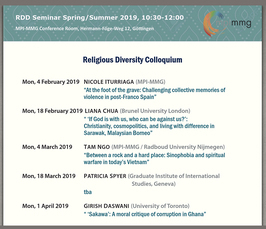"Between a rock and a hard place: Sacred geography and spiritual warfare in today’s Vietnam"
Religious Diversity Colloquium Spring/Summer 2019
- Datum: 04.03.2019
- Uhrzeit: 10:30 - 12:00
- Vortragende(r): Tam Ngo (MPI-MMG / Radboud University Nijmegen)
- Tam T. Ngo (ngo@mmg.mpg.de) is a member of the Department of Comparative Religious Studies (Radboud University, Nijmegen) and a research fellow at the Max Planck Institute for the Study of Religious and Ethnic Diversity, Gottingen, Germany. She is the author of the monograph The New Way: Protestantism and The Hmong in Vietnam (University of Washington Press, 2016) and “Dynamics of Memory and Religious Nationalism in a Sino-Vietnamese Border Town” (Modern Asian Study, Forthcoming), and co-editor of Atheist Secularism and Its Discontents: A Comparative Study of Religion and Communism in Eastern Europe and Asia (Palgrave MacMillan, 2015)
- Ort: MPI-MMG, Hermann-Föge-Weg 12, Göttingen
- Raum: Conference Room

For more details please contact vdvoffice(at)mmg.mpg.de.
As the dispute about the South China Sea has gained momentum a burgeoning anti-Chinese sentiment can be found in Vietnam. Because public demonstrations and protests are often suppressed by the Vietnamese communist authorities, many patriotic Vietnamese today employ alternatives to express their sentiments. This paper focuses on one of the anti-Chinese spiritual activities that are becoming popular in different circles of Vietnamese spiritists; giải yểm or the undoing of Chinese hexing (trấn yểm) of Vietnamese sacred geography. Believing that all problems that Vietnam is facing today can be traced to a long history of China domination of the country, Vietnamese spiritists conduct giải yểm rituals in a number of locations, where sacred veins in Vietnam’s Geobody are located. Spirit writing is employed as the main method by Vietnamese spiritists in this warfare. By analyzing a number of giải yểm events, this paper aims to shed light on the larger issue of sinophobia and the secret but widespread spiritual warfare in contemporary Vietnam.